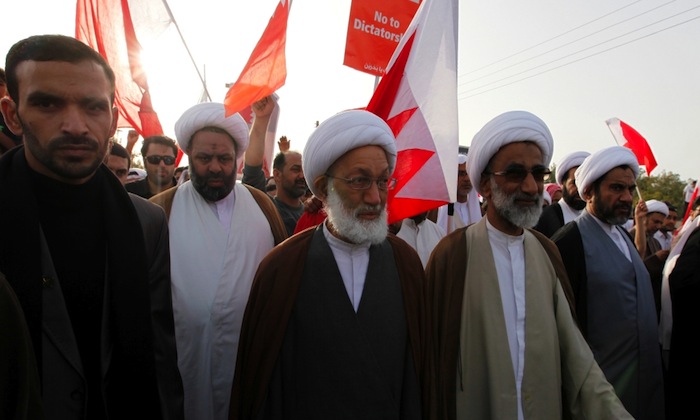
|
| Isa Qassim at a 2011 demonstration. Photo: Reuters |
MANAMA — Dozens of supporters of Ayatollah Isa Qassim, spiritual leader of Bahrain’s Shi’a Muslim majority, gathered at his home on Tuesday to protest the revocation of his citizenship, with some men wearing white shrouds signaling their readiness to die.
Protesters have been at the house since dawn and more are expected to join after breaking the Ramadan fast at sunset at around 6.30 p.m. Protests and political gatherings are forbidden in the Western-allied monarchy.
The move against Qassim strikes at the heart of Bahrain’s opposition and is part of an escalating crackdown following a court decision last week to shut down the main Shi’a political group al Wefaq.
The government put down a pro-reform uprising in 2011. Since then protesters have clashed almost daily with security forces, who have been targeted by several bomb attacks.
Bahrain has accused the opposition of undermining security and blamed the bombings on Iran and the armed Hezbollah, both of which have strongly condemned the moves against Ayatollah Qassim.
The Bahrain News Agency quoted the interior ministry on Monday as saying that Sheikh Isa Qassim had played a key role in creating an “extremist” sectarian atmosphere and working to divide Bahraini society.
Iran’s powerful Revolutionary Guards on Tuesday warned of an “Islamic revolution” in Bahrain in response to its stripping Qassim of his citizenship.
The United Nations also protested the decision, calling it “clearly unjustified” under international law.
“Given that due process was not followed, it cannot be justified,” a spokeswoman for the U.N. human rights office, Ravina Shamdasani, told a U.N. briefing in Geneva.
Shamdasani said deprivation of nationality was permitted under certain conditions but it had to serve a legitimate purpose, be proportionate to the interests protected and there had to be some recourse to appeal.
“We’re talking a minimum of 250 people who have been deprived of their nationality, but there are some estimates that go much higher than that, given that, it is clearly unjustified,” she said.
“We are very concerned at this intensified crackdown on the freedoms of expression and association and the right to a nationality.”
Top human rights campaigner Nabeel Rajab who has been repeatedly detained since 2011 and was arrested again last week on unspecified charges had his detention renewed on Tuesday for another eight days, his lawyer said on Twitter.
A hearing on whether al Wefaq, which won 18 out of 40 parliamentary seats in a 2010 election, should be permanently dissolved was brought up to Thursday from October, a lawyer for the group wrote on Twitter.






Leave a Reply